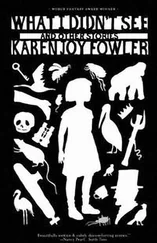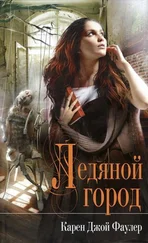Карен Фаулер - The Dark
Здесь есть возможность читать онлайн «Карен Фаулер - The Dark» весь текст электронной книги совершенно бесплатно (целиком полную версию без сокращений). В некоторых случаях можно слушать аудио, скачать через торрент в формате fb2 и присутствует краткое содержание. Жанр: Проза, на английском языке. Описание произведения, (предисловие) а так же отзывы посетителей доступны на портале библиотеки ЛибКат.
- Название:The Dark
- Автор:
- Жанр:
- Год:неизвестен
- ISBN:нет данных
- Рейтинг книги:4 / 5. Голосов: 1
-
Избранное:Добавить в избранное
- Отзывы:
-
Ваша оценка:
- 80
- 1
- 2
- 3
- 4
- 5
The Dark: краткое содержание, описание и аннотация
Предлагаем к чтению аннотацию, описание, краткое содержание или предисловие (зависит от того, что написал сам автор книги «The Dark»). Если вы не нашли необходимую информацию о книге — напишите в комментариях, мы постараемся отыскать её.
The Dark — читать онлайн бесплатно полную книгу (весь текст) целиком
Ниже представлен текст книги, разбитый по страницам. Система сохранения места последней прочитанной страницы, позволяет с удобством читать онлайн бесплатно книгу «The Dark», без необходимости каждый раз заново искать на чём Вы остановились. Поставьте закладку, и сможете в любой момент перейти на страницу, на которой закончили чтение.
Интервал:
Закладка:
Karen Joy Fowler
THE DARK
With her 1991 novel, Sarah Canary , Karen Joy Fowler brought off a remarkable feat: a work that the sometimes prissy literary world and the somewhat paranoid science fiction enclave embraced with equal ardor. While mainstream reviewers were perfectly content to discuss Sarah Canary as an exemplar of North American magical realism, SF critic John Clute hailed it as “the best First Contact novel ever written.” (The plot concerns the relationship between a Chinese laborer and a mysterious wild woman in the Pacific Northwest during the last century.) As I write these words, the Nebula Awards Report informs me that Sarah Canary has made the preliminary ballot for 1992; and so, even as she heads toward wider recognition, it appears that Fowler, like Ursula K. Le Guin before her, has retained the affections of her native community.
To date, Fowler has given us two short story collections, Peripheral Vision , from Pulphouse Publishing, and Artificial Things , from Bantam. In 1987 her work earned her the John W. Campbell Award as best new writer, and the following year she received a National Endowment for the Arts grant. Sarah Canary won the San Francisco Commonwealth Club medal for best first novel. It was my pleasure to reprint Fowler’s moving, poetic story “Lieserl” in Nebula Awards 26 .
“This is one of those things a writer should never confess,” notes Fowler, “but ‘The Dark’ began as a fleas-in-space story. I was impressed with the durability of fleas and thought that if we shot a dog or monkey to Mars, instead of simply sending it into orbit, and there was a tragic mishap, the dog or monkey would die, but the fleas would colonize the planet. The title of the original story was ‘The Oral Tradition,’ and a wonderful title it is, too.
“Fleas are not only durable, they are dangerous. I began to consider the possibilities of a new superhero — Flea Man — a sort of Spider Man, but able to leap tall buildings in a single bound and wipe out half of Europe. And then I suddenly stumbled over the accusation that fleas were used as a military weapon in the tunnel war in Vietnam. This rumor shaped ‘The Dark’ into the story it is now. Tragically, during many rewrites, the fleas were almost completely removed from the story. They remain only as shadowy figures manipulating the plot from the background. You have to look closely to see them. Then you realize they control everything.”
In the summer of 1954, Anna and Richard Becker disappeared from Yosemite National Park along with Paul Becker, their three-year-old son. Their campsite was intact; two paper plates with half-eaten frankfurters remained on the picnic table, and a third frankfurter was in the trash. The rangers took several black-and-white photographs of the meal, which, when blown up to eight by ten, as part of the investigation, showed clearly the words love bites , carved into the wooden picnic table many years ago. There appeared to be some fresh scratches as well; the expert witness at the trial attributed them, with no great assurance, to raccoon.
The Beckers’ car was still backed into the campsite, a green De Soto with a spare key under the right bumper and half a tank of gas. Inside the tent, two sleeping bags had been zipped together marital style and laid on a large tarp. A smaller flannel bag was spread over an inflated pool raft. Toiletries included three toothbrushes; Ipana toothpaste, squeezed in the middle; Ivory soap; three washcloths; and one towel. The newspapers discreetly made no mention of Anna’s diaphragm, which remained powdered with talc, inside its pink shell, or of the fact that Paul apparently still took a bottle to bed with him.
Their nearest neighbor had seen nothing. He had been in his hammock, he said, listening to the game. Of course, the reception in Yosemite was lousy. At home he had a shortwave set; he said he had once pulled in Dover, clear as a bell. “You had to really concentrate to hear the game,” he told the rangers. “You could’ve dropped the bomb. I wouldn’t have noticed.”
Anna Becker’s mother, Edna, received a postcard postmarked a day earlier. “Seen the firefall,” it said simply. “Home Wednesday. Love.” Edna identified the bottle. “Oh yes, that’s Paul’s bokkie,” she told the police. She dissolved into tears. “He never goes anywhere without it,” she said.
In the spring of 1960, Mark Cooper and Manuel Rodriguez went on a fishing expedition in Yosemite. They set up a base camp in Tuolumne Meadows and went off to pursue steelhead. They were gone from camp approximately six hours, leaving their food and a six-pack of beer zipped inside their backpacks zipped inside their tent. When they returned, both beer and food were gone. Canine footprints circled the tent, but a small and mysterious handprint remained on the tent flap. “Raccoon,” said the rangers who hadn’t seen it. The tent and packs were undamaged. Whatever had taken the food had worked the zippers. “Has to be raccoon.”
The last time Manuel had gone backpacking, he’d suspended his pack from a tree to protect it. A deer had stopped to investigate, and when Manuel shouted to warn it off the deer hooked the pack over its antlers in a panic, tearing the pack loose from the branch and carrying it away. Pack and antlers were so entangled, Manuel imagined the deer must have worn his provisions and clean shirts until antler-shedding season. He reported that incident to the rangers, too, but what could anyone do? He was reminded of it, guiltily, every time he read Thidwick, the Big-hearted Moose to his four-year-old son.
Manuel and Mark arrived home three days early. Manuel’s wife said she’d been expecting him.
She emptied his pack. “Where’s the can opener?” she asked.
“It’s there somewhere,” said Manuel.
“It’s not,” she said.
“Check the shirt pocket.”
“It’s not here.” Manuel’s wife held the pack upside down and shook it. Dead leaves fell out. “How were you going to drink the beer?” she asked.
In August of 1962, Caroline Crosby, a teenager from Palo Alto, accompanied her family on a forced march from Tuolumne Meadows to Vogelsang. She carried fourteen pounds in a pack with an aluminum frame — and her father said it was the lightest pack on the market, and she should be able to carry one-third her weight, so fourteen pounds was nothing, but her pack stabbed her continuously in one coin-sized spot just below her right shoulder, and it still hurt the next morning. Her boots left a blister on her right heel, and her pack straps had rubbed. Her father had bought her a mummy bag with no zipper so as to minimize its weight; it was stiflingly hot, and she sweated all night. She missed an overnight at Ann Watson’s house, where Ann showed them her sister’s Mark Eden bust developer, and her sister retaliated by freezing all their bras behind the twin-pops. She missed “The Beverly Hillbillies.”
Caroline’s father had quit smoking just for the duration of the trip, so as to spare himself the weight of cigarettes, and made continual comments about nature, which were laudatory in content and increasingly abusive in tone. Caroline’s mother kept telling her to smile.
In the morning her father mixed half a cup of stream water into a packet of powdered eggs and cooked them over a Coleman stove. “Damn fine breakfast,” he told Caroline intimidatingly as she stared in horror at her plate. “Out here in God’s own country. What else could you ask for?” He turned to Caroline’s mother, who was still trying to get a pot of water to come to a boil. “Where’s the goddamn coffee?” he asked. He went to the stream to brush his teeth with a toothbrush he had sawed the handle from in order to save the weight. Her mother told her to please make a little effort to be cheerful and not spoil the trip for everyone.
Читать дальшеИнтервал:
Закладка:
Похожие книги на «The Dark»
Представляем Вашему вниманию похожие книги на «The Dark» списком для выбора. Мы отобрали схожую по названию и смыслу литературу в надежде предоставить читателям больше вариантов отыскать новые, интересные, ещё непрочитанные произведения.
Обсуждение, отзывы о книге «The Dark» и просто собственные мнения читателей. Оставьте ваши комментарии, напишите, что Вы думаете о произведении, его смысле или главных героях. Укажите что конкретно понравилось, а что нет, и почему Вы так считаете.

![Карен Фаулер - Полпути [Halfway People ru]](/books/33522/karen-fauler-polputi-halfway-people-ru-thumb.webp)


![Карен Фаулер - Проклятие или дар [Черная книга страшных сказок] [сборник litres]](/books/390946/karen-fauler-proklyatie-ili-dar-chernaya-kniga-strash-thumb.webp)